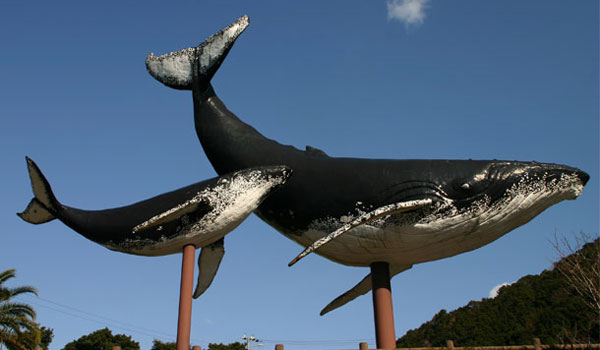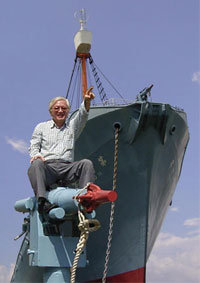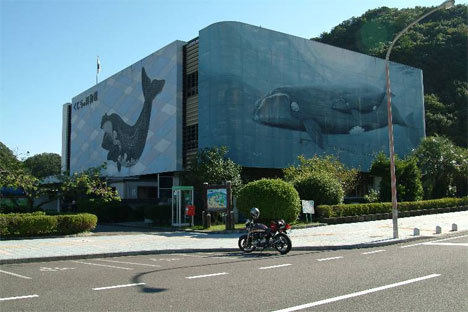Taiji's Official Stance
How the town views whales, dolphins and other cetaceans

Taiji whales
In Japan, Taiji is rarely mentioned without the words "dentou" (tradition) and "hogei" (whaling). The town promotes itself as the traditional home of whaling in Japan, and local and national governments endorse that claim. In an indication of how long the campign to stop the hunt in Taiji has been going on, a document titled "A Message from the People of Taiji, Japan" in 1994 by then mayor Setsuo Hamanaka, which gave the town's side of the story, included:
"No matter how viciously the environmentalists and animal rights activists condemn us, we will not give up whaling. We simply cannot do that, because it would mean to us not only a significant economic loss but also a loss of our pride and the unique culture of our own. A small village like Taiji would be wiped out completely by the massive forces of industrialization and commercialization without a pride for its own heritage and a strong sense of community identity."
"We believe we know more about our own sea in Taiji than anyone who lives hundreds or thousands of miles away from us. We also believe we are more concerned with its protection and assume more responsibilities than anybody else in the world."

The mayor of Taiji sits on top of a harpoon.

The Taiji Whale Museum, which also houses captive dolphins.
Taiji Declaration on Traditional Whaling
The 5th Summit of Japanese Traditional Whaling Communities was held in Taiji in April, 2006, with 1000 attendees from whaling communities across the country. Out of this summit came the "Taiji Declaration on Traditional Whaling," a document endorsed by the Japanese government and presented to the IWC that stated as its aim, the creation of a "new era" of whaling. The document included the following key claims related to Taiji:
- Taiji as a whole supports whaling and all the townspeople shall benefit from it;
- The consumptive use (small-type coastal whaling, drive fisheries, and hand-harpooning) and the non-consumptive use (whale watching, supply of live dolphins and porpoises to aquariums, and dolphin therapy) coexist in Taiji without conflict; and
- Taiji plays a leading role in sustaining tradition of whale diet by promoting whale meat use in school lunches not only in local communities but also in other communities all over Japan;
The issues raised by these claims include: there may not be conflict between the various parties in Taiji financially benefiting from the hunt and capture, but there are certainly conflicts of interest with regard to public health standards and animal rights issues; the inclusion of dolphins under the umbrella description of "whale," while not entirely incorrect, is deliberately misleading.
The document also included the major arguments that tend to be reeled off against any criticism of Japanese whale or dolphin hunting. The kanji characters for whales (kujira) and dolphins (iruka, literally "sea pig") are totally different, but the official documents avoid referring to smaller cetaceans, such as dolphins, as somehow separate or distinct.
- The stance of the IWC - "maintaining the commercial whaling moratorium without adequate scientific evidence" - and how it fails to "consider the impacts of these policies on the lives of whalers and whaling communities";
- "A successful environmental policy should not alienate humans from nature and environment but consider sustainability of the overall ecosystem that includes humans. The unique Japanese concept of “sato-yama” (community mountain) which implies active human involvement of nature and environment in which humans act as guardians to ensure nature's sustainability and balance";
- Due to global over-population, "we should not negate the use of any animals on non-scientific grounds; whaling is, compared with agriculture and animal farming, an environmentally sound way to harvest food, which makes whaling indispensable today and in the future";
- "Food diversity, cultural diversity , and environmental diversity are closely interrelated";
- "That creatures kill and sacrifice other creatures so that they can sustain their lives is the law of nature and is beyond any consideration of good and evil";
- "Japanese whalers take their responsibilities seriously when they harvest whales, utilizing the animals fully, wasting none of the whale, by building tombs for the whales’ souls and conducting memorial services to honor the animals sacrificed; on the other hand, by differentiating lives between domesticated animals and wildlife, and justifying the killings of the former while denouncing the latter, is discriminatory action considering importance of given animals in particular countries and cultures";
- It is a "double standard to criticize whaling as a cruel act by giving a name to a particular whale" (read - dolphin!) "and treating the issue on the individual animal basis while promoting culling of over-populated wildlife (kangaroo, deer, and camel) by treating the cull issue on a species basis for the sake of preservation of species and not focusing on its aspect of cruelty";
Taiji's Reaction to The Cove
The reaction of Taiji town officials to the news that The Cove had won the Academy Award in March 2010 was predictable. They had tried to block and then attended the first screening of the movie in Japan, at the Tokyo International Film Festival, the previous autumn. They were described as having filed out of the theater stony-faced when the movie got a good reception from the festival audience. They had a half a year to prepare for the possible news of an Oscar bringing more unwelcome attention on their town.
When it came, they trotted out the usual string of justifications, "It's a cultural food tradition that has continued for around 400 years," or "This is a national issue, foreigners should not butt in." Hirotaka Akamatsu, the Minister of Agriculture, Forestry, and Fisheries, was quoted at a press conference a couple of days later as saying the Oscar was "unfortunate" because he felt the message being presented by The Cove was that "the Japanese are barbarous." The limited media coverage given to the story focused on things like the fact that keys scenes had been filmed with hidden cameras, claims that spotty data was presented as scientific fact, and the privacy of Taiji fishermen had been violated. Mayor Kazutaka Sangen said in a statement, "I think it is regrettable that the film presents as fact material that is not backed up by scientific proof."
In the wake of the media attention and a series of visits to Taiji by activists, the town became increasingly suspicious and hostile towards outsiders.
Related content
